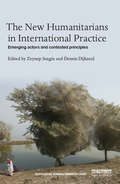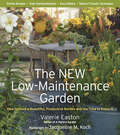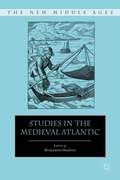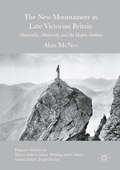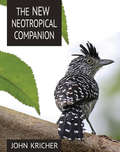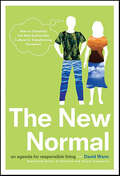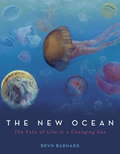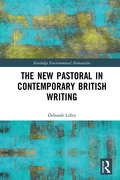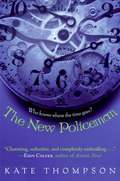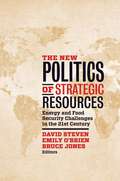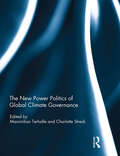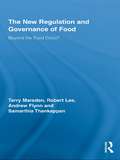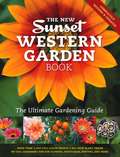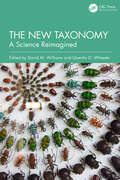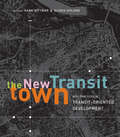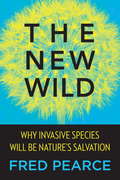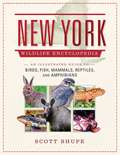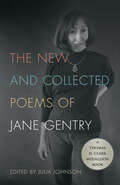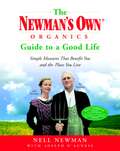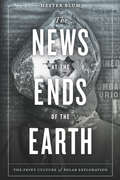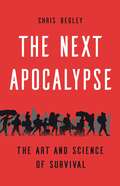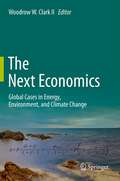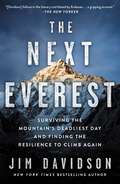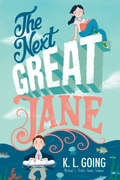- Table View
- List View
The New Humanitarians in International Practice: Emerging actors and contested principles (Routledge Humanitarian Studies)
by Dennis Dijkzeul Zeynep SezginAs humanitarian needs continue to grow rapidly, humanitarian action has become more contested, with new actors entering the field to address unmet needs, but also challenging long-held principles and precepts. This volume provides detailed empirical comparisons between emerging and traditional humanitarian actors. It sheds light on why and how the emerging actors engage in humanitarian crises and how their activities are carried out and perceived in their transnational organizational environment. It develops and applies a conceptual framework that fosters research on humanitarian actors and the humanitarian principles. In particular, it simultaneously refers to theories of organizational sociology and international relations to identify both the structural and the situational factors that influence the motivations, aims and activities of these actors, and their different levels of commitment to the traditional humanitarian principles. It thus elucidates the role of the humanitarian principles in promoting coherence and coordination in the crowded and diverse world of humanitarian action, and discusses whether alternative principles and parallel humanitarian systems are in the making. This volume will be of great interest to postgraduate students and scholars in humanitarian studies, globalization and transnationalism research, organizational sociology, international relations, development studies, and migration and diaspora studies, as well as policy makers and practitioners engaged in humanitarian action, development cooperation and migration issues.
The New Low-Maintenance Garden: How to Have a Beautiful, Productive Garden and the Time to Enjoy It
by Valerie Easton Jacqueline Knox Jacqueline M. KochDo you ever lament that you'd love to be able to garden more, but just don't have the time? The demanding pace of modern life leaves little space for the pleasures of gardening. On the other hand, gardening itself could be the culprit: elaborate, traditional perennial borders; water-hungry or disease-prone plants; needy lawns; and high-maintenance plants that require staking or clipping all suck up precious hours. Simply put, we need to start gardening in a whole new way. In this inspiring book, Val Easton shows exactly how to have a low-maintenance garden that doesn't sacrifice style. You won't have to give up your favorite plants or settle for expanses of ugly bark nuggets. You just have to unlearn some bad old habits and pick up some good new ones. So, how do you go about making a "new" low-maintenance garden? First, design your garden with maintenance in mind—good-looking hardscape will both save weeding time and showcase your favorite plants. Second, simplify your garden routines—learn the most efficient planting and maintenance techniques and don't get stressed if everything isn't letter-perfect. Third, learn how to work with nature rather than against it. And finally, embrace home-grown fruits, herbs, and vegetables; well planted containers; and thoughtfully chosen plants.The New Low-Maintenance Garden doesn't just tell you how to garden in a whole new way—it shows you, through profiles and beautiful photographs of real gardens that embody low-maintenance techniques. The pressures of life are not likely to ease up anytime soon, but the lessons of this timely book will help you banish guilt over undone garden chores and revel in your garden successes.
The New Middle Ages
by Benjamin HudsonThis collection of essays offers fresh analysis of topics in the exciting area of Atlantic World studies. Challenging standard assumptions, the essays advance the argument that the Atlantic Ocean was a region that encompassed ethnic and political boundaries, in which a sub-community shaped by culture and commerce arose.
The New Mountaineer in Late Victorian Britain
by Alan McneeThis book is about the rise of a new ethos in British mountaineering during the late nineteenth century. It traces how British attitudes to mountains were transformed by developments both within the new sport of mountaineering and in the wider fin-de-siècle culture. The emergence of the new genre of mountaineering literature, which helped to create a self-conscious community of climbers with broadly shared values, coincided with a range of cultural and scientific trends that also influenced the direction of mountaineering. The author discusses the growing preoccupation with the physical basis of aesthetic sensations, and with physicality and materiality in general; the new interest in the physiology of effort and fatigue; and the characteristically Victorian drive to enumerate, codify, and classify. Examining a wide range of texts, from memoirs and climbing club journals to hotel visitors' books, he argues that the figure known as the 'New Mountaineer' was seen to embody a distinctly modern approach to mountain climbing and mountain aesthetics.
The New Neotropical Companion
by John KricherThe New Neotropical Companion is the completely revised and expanded edition of a book that has helped thousands of people to understand the complex ecology and natural history of the most species-rich area on Earth, the American tropics. Featuring stunning color photos throughout, it is a sweeping and cutting-edge account of tropical ecology that includes not only tropical rain forests but also other ecosystems such as cloud forests, rivers, savannas, and mountains. This is the only guide to the American tropics that is all-inclusive, encompassing the entire region's ecology and the amazing relationships among species rather than focusing just on species identification.The New Neotropical Companion is a book unlike any other. Here, you will learn how to recognize distinctive ecological patterns of rain forests and other habitats and to interpret how these remarkable ecosystems function—everything is explained in clear and engaging prose free of jargon. You will also be introduced to the region's astonishing plant and animal life.Informative and entertaining, The New Neotropical Companion is a pleasurable escape for armchair naturalists, and visitors to the American tropics will want to refer to this book before, during, and after their trip.Covers all of tropical AmericaDescribes the species and habitats most likely to be observed by visitorsIncludes every major ecosystem, from lowland rain forests to the high AndesFeatures a wealth of color photos of habitats, plants, and animals
The New Normal: An Agenda for Responsible Living
by David WannIn Simple Prosperity, Dave Wann showed readers how to have an abundant, sustainable life. In The New Normal, he challenges us to do some heavy lifting and transform our non-sustainable culture by transforming ourselves. For Wann, our current "old normal" lifestyle - buying water in disposable bottles, allowing the government to ignore global warming - will not preserve the planet. To nurture our world, he challenges us to rethink our lives, stand up for a healthy planet and move towards a "new normal" lifestyle in an agenda that includes:- Initiating local business alliances that actively lobby for local buying.- Creating an investment strategy that values the balance of nature.- Supporting the design, manufacture, and use of products made with natural chemicals.- Publicly advocating a more efficient use of water by placing a higher cultural value on wetlands, streams, rivers, and lakes.The New Normal is Dave Wann's way forward, a blueprint for a better life that preserves our world.
The New Ocean: The Fate of Life in a Changing Sea
by Bryn BarnardA fascinating look at the future of our oceans—and how human actions may change them. The Earth—our home—is covered mostly with water: the wide, deep, salty, and very blue ocean. It regulates our climate in a way that makes life as we know it possible. This huge ocean is full of an amazing amount of life, most of which is too small to see. But life in the ocean is in trouble. The ocean is becoming hotter, more polluted, and, in places, empty of life. The right amount of warming is good for us, but too much warming is causing shifts that are not good for life in the ocean. Global warming, pollution, and overfishing are creating a New Ocean, in which life is changing drastically. This book tells the stories of the probable fates of six sea dwellers: jellyfish, orcas, sea turtles, tuna, corals, and blue-green algae. What becomes of them may help you understand what becomes of us.
The New Pastoral in Contemporary British Writing (Routledge Environmental Humanities)
by Deborah LilleyThis book identifies a major turn in contemporary British literature in response to environmental crisis. It argues that the pastoral is emerging as a new critical framework in which to explore the understanding of people and place in this context. The New Pastoral in Contemporary British Writing explores how the pastoral tradition has transformed as authors respond to our changing relationships with place in this period. Analysing the features common to new pastoral writing, it brings together a corpus of works from major authors including Ali Smith, Jim Crace, John Burnside, Kathleen Jamie, and Robert Macfarlane. This book argues that crises such as pollution and climate change have shifted our understandings of the key relationships of pastoral and the terms upon which they are based, giving new senses to its older oppositions between the human and the natural, the urban and the rural, and the past and the present. Furthermore, it shows that the versions of pastoral that ensue align with current ecocritical arguments produced by thinking through the individual, cultural, and ecological implications of environmental crisis. As a result, pastoral emerges as the crucial strategy in the re-imagining of the environment underway in contemporary British writing, the resurgence of interest in nature writing, the increasing attention towards place in literary fiction, and the development of ecological or ‘climate’ fiction. This book will be of great interest to students and scholars of English as well as those concerned with the interdisciplinary topics of the environmental humanities, including literary geographies, new nature writing, cultures of climate change and the Anthropocene, and ecologically-oriented theory.
The New Policeman
by Kate ThompsonWho knows where the time goes? There never seems to be enough time in Kinvara, or anywhere else in Ireland for that matter. When J.J.'s mother says time's what she really wants for her birthday, J.J. decides to find her some. He's set himself up for an impossible task . . . until a neighbor reveals a secret. There's a place where time stands still--at least, it's supposed to. J.J. can make the journey there, but he'll have to vanish from his own life to do so. Can J.J. find the leak between the two worlds? Will a shocking rumor about his family's past come back to haunt him? And what does it all have to do with the village's new policeman . . . ?
The New Politics of Strategic Resources
by Bruce D. Jones David Steven Emily O'BrienSince 2008, energy and food markets-those most fundamental to human existence-have remained in turmoil. Resource scarcity has had a much bigger global impact in recent years than has been predicted, with ongoing volatility a sign that the world is only part-way through navigating a treacherous transition in the way it uses resources. Scarcity, and perceptions of scarcity, increase political risks, while geopolitical turmoil exacerbates shortages and complicates the search for solutions. The New Politics of Strategic Resources examines the political dimensions of strategic resource challenges at the domestic and international levels. For better or worse, energy and food markets are shaped by perceptions of national interest and do not behave as traditional market goods. So while markets are an essential part of any response to tighter resource supplies, governments also will play a key role. David Steven, Emily O'Brien, Bruce Jones, and their colleagues discuss what those roles are and what they should be.The architecture for coordinating multilateral responses to these dynamics has fallen short, raising questions about the effective international management of these issues. Politics impede here too, as the major powers must negotiate political and security trade-offs to cooperate on the design of more robust international regimes and mechanisms for resource security and the provision of global public goods.This timely volume includes chapters on major powers (United States, India, China) and key suppliers (Russia, Saudi Arabia). The contributors also address thematic topics, such as the interaction between oil and state fragility; the changing political dynamics of climate change; and the politics of resource subsidies.
The New Power Politics of Global Climate Governance
by Maximilian Terhalle Charlotte StreckThis book is based on the assumption that great powers determine global politics and, in this instance, environmental politics. It addresses the approaches of both established and rising powers and their implications for the advancement of international climate negotiations. The new introduction looks at the key developments in this realm since 2013, examining the bilateral deals between China and the United States and the results of the UNFCCC’s 21st Convention of the Parties (COP) convening at Paris in 2015. Two key features link the contributions of this volume: their underlying assumption that major powers are the central actors in determining global environmental politics; and their assessment of, and implications of, the approaches both of rising and established major powers for global climate norms. One key argument of this volume is that today’s geopolitics are about who gets how much in the fiercely competitive race over the available ‘carbon space’. The book concludes that prudently balancing power in the new century requires a fair sharing of burden among the existing and emerging powers. In light of such burden-sharing, pluralistic domestic politics as well as diverging normative beliefs and worldviews require consideration of different conditions, even if historical legacies of the industrialised world have increasingly been put into question as a political argument by the United States.This book is based on a special issue of the journal Climate Policy.
The New Regulation and Governance of Food: Beyond the Food Crisis? (Routledge Studies in Human Geography)
by Robert Lee Terry Marsden Andrew Flynn Samarthia ThankappanMajor questions surround who, how, and by what means should the interests of government, the private sector, or consumers hold authority and powers over decisions concerning the production and consumption of foods. This book examines the development of food policy and regulation following the BSE (mad cow disease) crisis of the late 1990s, and traces the changing relationships between three key sets of actors: private interests, such as the corporate retailers; public regulators, such as the EU directorates and UK agencies; and consumer groups at EU and national levels. The authors explore how these interests deal with the conundrum of continuing to stimulate a corporately organised and increasingly globalised food system at the same time as creating a public and consumer-based legitimate framework for it. The analysis develops a new model and synthesis of food policy and regulation which reassesses these public/private sector responsibilities with new evidence and theoretical insights.
The New Sunset Western Garden Book: The Ultimate Gardening Guide (Ninth Edition)
by Kathleen Norris BrenzelThis book is an indispensable reference for beginning and expert gardeners alike. Completely redesigned and updated, this ninth edition includes a fresh new look, thousands of color photographs, fresh illustrations, and an easy-to-follow format.
The New Taxonomy: A Science Reimagined
by Quentin D. Wheeler David M. WilliamsToday molecular data is part of many biological studies, including taxonomic works. Such data is embraced by taxonomists for good reasons. When combined with comparative morphology, palaeontology, and embryology, it creates a rich, integrated overview of the history of life. This book is intended as a clear articulation of the mission, goals, and needs of fundamental taxonomists and a planetary-scale inventory of species by revisiting the idea of taxonomy as a fusion of the traditional questions asked by taxonomists and the latest technologies. It is a clear roadmap to a taxonomic renaissance and world species inventory.Key Features: Establishes the role and responsibilities of natural history museums to baseline taxonomic studies Emphasizes the potential of ‘descriptive’ taxonomy Proposes a cyberinfrastructure specifically designed to meet the needs of taxonomists to do taxonomy Provides a clear statement of taxonomy’s mission, goals, and prospects Reviews taxonomic philosophies and codes of nomenclature from an historical perspective
The New Transit Town: Best Practices In Transit-Oriented Development
by Hank Dittmar Gloria OhlandTransit-oriented development (TOD) seeks to maximize access to mass transit and nonmotorized transportation with centrally located rail or bus stations surrounded by relatively high-density commercial and residential development. New Urbanists and smart growth proponents have embraced the concept and interest in TOD is growing, both in the United States and around the world.New Transit Town brings together leading experts in planning, transportation, and sustainable design--including Scott Bernstein, Peter Calthorpe, Jim Daisa, Sharon Feigon, Ellen Greenberg, David Hoyt, Dennis Leach, and Shelley Poticha--to examine the first generation of TOD projects and derive lessons for the next generation. It offers topic chapters that provide detailed discussion of key issues along with case studies that present an in-depth look at specific projects. Topics examined include:*the history of projects and the appeal of this form of development*a taxonomy of TOD projects appropriate for different contexts and scales*the planning, policy and regulatory framework of "successful" projects*obstacles to financing and strategies for overcoming those obstacles*issues surrounding traffic and parking*the roles of all the actors involved and the resources available to them*performance measures that can be used to evaluate outcomesNew Transit Town explores the key challenges to transit-oriented development, examines the lessons learned from the first generation of projects, and uses a systematic examination and analysis of a broad spectrum of projects to set standards for the next generation. It is a vital new source of information for anyone interested in urban and regional planning and development, including planners, developers, community groups, transit agency staff, and finance professionals.
The New Wild
by Fred PearceA provocative exploration of the "new ecology" and why most of what we think we know about alien species is wrong For a long time, veteran environmental journalist Fred Pearce thought in stark terms about invasive species: they were the evil interlopers spoiling pristine "natural" ecosystems. Most conservationists and environmentalists share this view. But what if the traditional view of ecology is wrong--what if true environmentalists should be applauding the invaders? In The New Wild, Pearce goes on a journey across six continents to rediscover what conservation in the twenty-first century should be about. Pearce explores ecosystems from remote Pacific islands to the United Kingdom, from San Francisco Bay to the Great Lakes, as he digs into questionable estimates of the cost of invader species and reveals the outdated intellectual sources of our ideas about the balance of nature. Pearce acknowledges that there are horror stories about alien species disrupting ecosystems, but most of the time, the tens of thousands of introduced species usually swiftly die out or settle down and become model eco-citizens. The case for keeping out alien species, he finds, looks increasingly flawed. As Pearce argues, mainstream environmentalists are right that we need a rewilding of the earth, but they are wrong if they imagine that we can achieve that by reengineering ecosystems. Humans have changed the planet too much, and nature never goes backward. But a growing group of scientists is taking a fresh look at how species interact in the wild. According to these new ecologists, we should applaud the dynamism of alien species and the novel ecosystems they create. In an era of climate change and widespread ecological damage, it is absolutely crucial that we find ways to help nature regenerate. Embracing the new ecology, Pearce shows us, is our best chance. To be an environmentalist in the twenty-first century means celebrating nature's wildness and capacity for change.From the Hardcover edition.
The New York Wildlife Encyclopedia: An Illustrated Guide to Birds, Fish, Mammals, Reptiles, and Amphibians
by Scott ShupeIn The New York Wildlife Encyclopedia, nationally known naturalist Scott Shupe has collected information on all the wildlife that reside in the Empire State. The first in a series of state wildlife encyclopedias, this book will be a handy, usable, layman’s guide to New York’s wildlife.Included are over 800 color photographs, depicting the different species of mammals, reptiles, amphibians, birds, and fish, while also offering over 600 range maps to show their territory. Along with basic information for the biology of each animal, Shupe includes the size, habitat, and abundance of each species located in the state.Whether you’re a lover of the outdoors, photography, or are looking to learn more about your state, this comprehensive guide will teach you about the wonderful wildlife that covers the water, earth, and skies of New York.
The New and Collected Poems of Jane Gentry
by Jane GentryThis definitive anthology assembles a wide-ranging retrospective of Gentry’s most celebrated poems alongside new, previously unpublished works.Jane Gentry (1941–2014) possessed an uncanny ability to spin quietly expansive and wise verses from small details, objects, and remembered moments. The hallmarks of her work are insight into nature, faith, the quotidian, and?perhaps most prominently?the grounding of her home and family in the state of Kentucky. This innovative poet and critic was for many years one of the animating spirits of literary life in the region.Gentry and her daughters collaborated with editor Julia Johnson to organize this definitive collection. Johnson uses Gentry’s own methodology to arrange the poems in sequences comparable to those found in her previous collections. This organization showcases the range of the poet’s work and the flexibility of her style, which is sometimes ironic and humorous; sometimes poignant; but always clear, intelligent, and revelatory.This volume includes two full-length collections of poetry in their entirety?A Garden in Kentucky and Portrait of the Artist as a White Pig. The final section features Gentry’s unpublished work, bringing together her early poems, verses written for loved ones, and a large group of more recent work that may have been intended for future collections. Alternately startling and heart-wrenching, The New and Collected Poems of Jane Gentry offers a valuable retrospective of the celebrated poet’s work.
The New and Improved Sarah (Camp Sunnyside Friends #9)
by Marilyn KayeKatie, Trina, Megan, Sarah, and Erin are back at the all-girls camp--Camp Sunnyside. Sarah notices that a lot of guys like Erin and decides that maybe she should do a makeover! But little does Sarah now that it takes more than your looks to get a boy's attention and there are some things that are more important than any boy.
The Newman's Own Organics Guide to a Good Life: Simple Measures That Benefit You and the Place You Live
by Nell Newman Joseph D'AgneseIt’s fairly obvious that one can’t be a ‘perfect’ environmentalist. But that’s okay. Perfection isn’t the goal. A good life is. And a good life has as much to do with your intent as with the end result.” —from the IntroductionThe Newman’s Own Organics Guide to a Good Life is the essential book for those of us who can’t live in an organic hemp tepee but do care about our quality of life, global warming, clean water, and disappearing resources.Nell Newman shows you how to do what is within easy reach. Along with realistic, practical advice, she shows how and why living a more environmentally conscious life benefits you and your immediate surroundings. In addition to recycling and reusing, the book covers consumer-related steps such as• how buying and eating organic food supports small farms (and tastes better, too)• how you can buy clean power through your regular power company• which long-distance telephone companies offer competitive pricing and service while returning a portion of their profits to environmental and educational organizations• where to buy everything—from pots and pans to pet food—so that you can “vote with your dollar” and feel good about your purchasesPacked with profiles of fascinating—and sometimes zany—people and a heavy dose of sanity, this book is organized according to the way you really live, making it easy to identify what areas of change are viable for you. A resource directory of publications, retailers, groups, and associations is included in the back of the book.
The News at the Ends of the Earth: The Print Culture of Polar Exploration
by Hester BlumFrom Sir John Franklin's doomed 1845 search for the Northwest Passage to early twentieth-century sprints to the South Pole, polar expeditions produced an extravagant archive of documents that are as varied as they are engaging. As the polar ice sheets melt, fragments of this archive are newly emergent. In The News at the Ends of the Earth Hester Blum examines the rich, offbeat collection of printed ephemera created by polar explorers. Ranging from ship newspapers and messages left in bottles to menus and playbills, polar writing reveals the seamen wrestling with questions of time, space, community, and the environment. Whether chronicling weather patterns or satirically reporting on penguin mischief, this writing provided expedition members with a set of practices to help them survive the perpetual darkness and harshness of polar winters. The extreme climates these explorers experienced is continuous with climate change today. Polar exploration writing, Blum contends, offers strategies for confronting and reckoning with the extreme environment of the present.
The Next Apocalypse: The Art and Science of Survival
by Chris BegleyIn this insightful book, an underwater archaeologist and survival coach shows how understanding the collapse of civilizations can help us prepare for a troubled future.Pandemic, climate change, or war: our era is ripe with the odor of doomsday. In movies, books, and more, our imaginations run wild with visions of dreadful, abandoned cities and returning to the land in a desperate attempt at survival.In The Next Apocalypse, archaeologist Chris Begley argues that we completely misunderstand how disaster works. Examining past collapses of civilizations, such as the Maya and Rome, he argues that these breakdowns are actually less about cataclysmic destruction than they are about long processes of change. In short: it&’s what happens after the initial uproar that matters. Some people abandon their homes and neighbors; others band together to start anew. As we anticipate our own fate, Begley tells us that it was communities, not lone heroes, who survived past apocalypses—and who will survive the next.Fusing archaeology, survivalism, and social criticism, The Next Apocalypse is an essential read for anxious times.
The Next Economics
by Woodrow W. Clark IIThe Next Economics focuses on how the field of economics must change and incorporate environment, energy, health and new technologies that are called externalities for stopping and reversing climate change. The field of economics needs to become a science. Economics in this book for the Green Industrial Revolution which goes beyond the third industrial revolution since it covers cases, examples and specific economic analyses that both scientific and global. The book concerns climate change and how the Economics for Externalities, needs to range from energy and national security to infrastructure and communities. Solutions and cases of the "Next Economics" are based in western philosophical economic paradigms and how that is changing due to the significance of current global economic and societal concerns. Finally practical applications for economics are explored using global environmental and energy issues. Areas that need a fresh look at and be integrated with economics, include the environment, social and political issues, energy, health climate change and their infrastructures, as they are major components of the macroeconomics for the future. Based on past economic models, these subjects have been lost or ill fitted into modern economic theory. The challenge is to explore and to look deeply into economics in order to provide it a new direction with the possibility for understanding, changing and saving the planet from climate change. This book presents to economists and policy-makers alike areas of environmental economics, energy policy, health and social issues which are needed to stop and reverse climate change.
The Next Everest: Surviving the Mountain's Deadliest Day and Finding the Resilience to Climb Again
by Jim DavidsonA dramatic account of the deadly avalanche on Everest—and a return to reach the summit.On April 25, 2015, Jim Davidson was climbing Mount Everest when a 7.8-magnitude earthquake released avalanches all around him and his team, destroying their only escape route and trapping them at nearly 20,000 feet. It was the largest earthquake in Nepal in eighty-one years and killed nearly 8,900 people. That day also became the deadliest in the history of Everest, with eighteen people losing their lives on the mountain.After spending two unsettling days stranded on Everest, Davidson's team was rescued by helicopter. The experience left him shaken, and despite his thirty-three years of climbing and serving as an expedition leader, he wasn’t sure that he would ever go back. But in the face of risk and uncertainty, he returned in 2017 and finally achieved his dream of reaching the summit.Suspenseful and engrossing, The Next Everest portrays the experience of living through the biggest disaster to ever hit the mountain. Davidson's background in geology and environmental science makes him uniquely qualified to explain why the seismic threats lurking beneath Nepal are even greater today. But this story is not about “conquering” the world’s highest peak. Instead, it reveals how embracing change, challenge, and uncertainty prepares anyone to face their next “Everest” in life.
The Next Great Jane
by K. L. GoingFrom award-winning author K. L. Going comes a happily-ever-after story of a girl who discovers the true secret to all good writing--through an unlikely friendship, some well-intentioned matchmaking, and little bit of science.Jane Brannen wants nothing more than to become a famous author like Jane Austen--she just needs to figure out the key to literary success! Her chance to uncover the secret arrives when bestselling author J. E. Fairfax visits her tiny town of Whickett Harbor. Unfortunately, a hurricane rolls in and Jane gets stuck with the author's snobbish son, Devon, instead. But when the skies clear, Jane realizes the wind has blown in something worse than annoying boys: Her mother, Susan, and Susan's new fiancé, Erik, have flown all the way from Hollywood to file for custody and bring Jane back to California. Now she needs to find a mate for her marine biologist father and figure out what's truly important about Whickett Harbor, so she can prove to her mother that this is where she's meant to stay.
